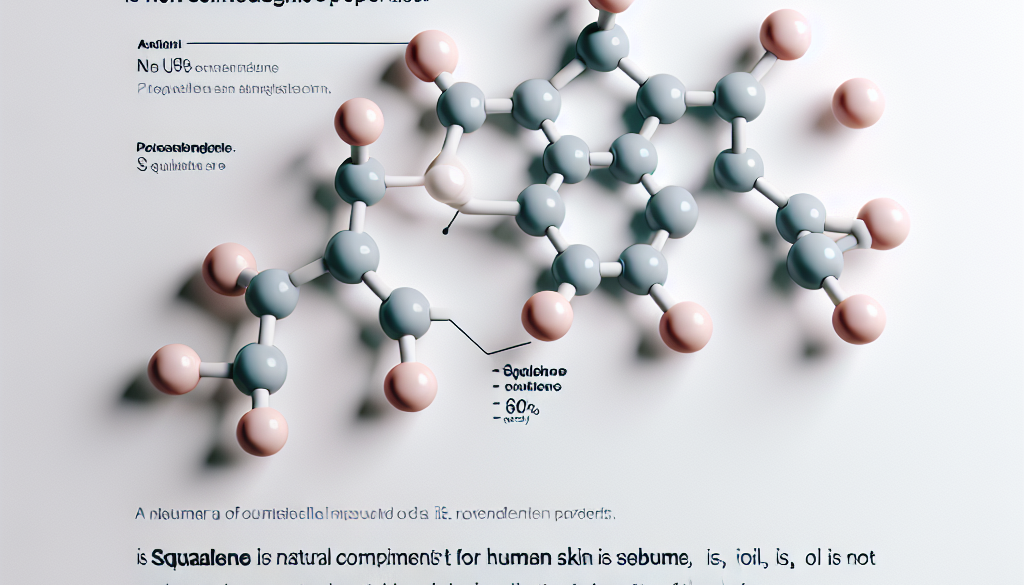Squalene Comedogenic: What to Know
-
Table of Contents
- Squalene Comedogenicity: Essential Insights for Skincare
- Understanding Squalene and Its Role in Skincare
- Is Squalene Comedogenic?
- Factors Influencing Squalene’s Comedogenicity
- Research and Case Studies on Squalene Comedogenicity
- How to Use Squalene Safely in Your Skincare Routine
- Alternatives to Squalene for Acne-Prone Skin
- Conclusion: Balancing the Benefits and Risks of Squalene
- Discover ETprotein’s Premium Protein Products
Squalene Comedogenicity: Essential Insights for Skincare
When it comes to skincare ingredients, the term “comedogenic” often raises concerns among consumers. Comedogenic substances are those that have the potential to clog pores and exacerbate acne conditions. Squalene, a natural compound found in our skin and in various skincare products, has been a topic of discussion regarding its comedogenic properties. This article delves into what you need to know about squalene and its effects on the skin.
Understanding Squalene and Its Role in Skincare
Squalene is a hydrocarbon that is naturally produced by our skin cells. It is a vital component of the skin’s lipid barrier, which helps to maintain moisture and protect against environmental aggressors. In skincare, squalene is valued for its moisturizing properties and is often derived from plant sources such as olives, amaranth seeds, and rice bran, or from shark liver, where it is present in high concentrations.
Is Squalene Comedogenic?
The question of whether squalene is comedogenic is complex. Squalene itself is considered to have a low comedogenic rating, meaning it is unlikely to clog pores when used in moderation. However, individual skin types and the concentration of squalene in a product can influence its comedogenic potential.
- For those with oily or acne-prone skin, using products with high concentrations of squalene may increase the risk of clogged pores.
- Conversely, individuals with dry or mature skin may benefit from squalene’s emollient properties without experiencing comedogenic effects.
Factors Influencing Squalene’s Comedogenicity
Several factors can affect the comedogenicity of squalene in skincare products:
- Source of Squalene: Plant-derived squalene is considered to be less comedogenic than animal-derived squalene due to its purity and stability.
- Formulation: The formulation of the skincare product, including the presence of other comedogenic ingredients, can impact the overall comedogenicity of the product.
- Personal Skin Type: As mentioned earlier, individual skin types play a significant role in how squalene affects the skin.
Research and Case Studies on Squalene Comedogenicity
Scientific research on squalene’s comedogenicity is limited, but some studies suggest that squalene oxidation products may contribute to acne development. When squalene is exposed to UV light and air, it can oxidize and become more comedogenic. Therefore, it is crucial to use skincare products with antioxidants to prevent squalene oxidation.
Case studies have shown that individuals with acne-prone skin may experience more breakouts when using heavy oils and emollients, including squalene. However, these cases are highly individual, and not everyone with acne-prone skin will react negatively to squalene.
How to Use Squalene Safely in Your Skincare Routine
To minimize the risk of comedogenic effects while enjoying the benefits of squalene, consider the following tips:
- Choose non-comedogenic products that contain squalene in combination with other non-clogging ingredients.
- Start with lower concentrations of squalene and observe how your skin reacts before increasing the amount.
- Look for products with added antioxidants to prevent squalene oxidation.
- Perform a patch test before incorporating a new squalene-containing product into your routine.
Alternatives to Squalene for Acne-Prone Skin
If you find that squalene does not agree with your skin, there are alternative ingredients that offer similar benefits without the risk of comedogenicity:
- Hyaluronic Acid: Provides hydration without clogging pores.
- Niacinamide: Improves skin barrier function and reduces inflammation.
- Squalane: A hydrogenated form of squalene that is lighter and less likely to oxidize.
Conclusion: Balancing the Benefits and Risks of Squalene
In conclusion, squalene can be a beneficial ingredient in skincare, particularly for those with dry or mature skin. However, its comedogenic potential should not be overlooked, especially for individuals with oily or acne-prone skin. By understanding the factors that influence squalene’s comedogenicity and choosing products wisely, you can harness the moisturizing power of squalene without compromising your skin’s clarity.
Discover ETprotein’s Premium Protein Products
If you’re looking for high-quality protein products to complement your health and skincare routine, consider ETprotein’s offerings. Their extensive range of organic bulk vegan proteins and L-(+)-Ergothioneine (EGT) caters to various industries, including nutraceuticals and cosmeceuticals. With non-GMO, allergen-free attributes, and high purity levels, ETprotein’s products are an excellent choice for those seeking to enhance their wellness and beauty regimens.
About ETprotein:
ETprotein, a reputable protein and L-(+)-Ergothioneine (EGT) Chinese factory manufacturer and supplier, is renowned for producing, stocking, exporting, and delivering the highest quality organic bulk vegan proteins and L-(+)-Ergothioneine. They include Organic rice protein, clear rice protein, pea protein, clear pea protein, watermelon seed protein, pumpkin seed protein, sunflower seed protein, mung bean protein, peanut protein, and L-(+)-Ergothioneine EGT Pharmaceutical grade, L-(+)-Ergothioneine EGT food grade, L-(+)-Ergothioneine EGT cosmetic grade, L-(+)-Ergothioneine EGT reference grade and L-(+)-Ergothioneine EGT standard. Their offerings, characterized by a neutral taste, non-GMO, allergen-free attributes, with L-(+)-Ergothioneine purity over 98%, 99%, cater to a diverse range of industries. They serve nutraceutical, pharmaceutical, cosmeceutical, veterinary, as well as food and beverage finished product distributors, traders, and manufacturers across Europe, USA, Canada, Australia, Thailand, Japan, Korea, Brazil, and Chile, among others.
ETprotein specialization includes exporting and delivering tailor-made protein powder and finished nutritional supplements. Their extensive product range covers sectors like Food and Beverage, Sports Nutrition, Weight Management, Dietary Supplements, Health and Wellness Products, and Infant Formula, ensuring comprehensive solutions to meet all your protein needs.
As a trusted company by leading global food and beverage brands and Fortune 500 companies, ETprotein reinforces China’s reputation in the global arena. For more information or to sample their products, please contact them and email sales(at)ETprotein.com today.














